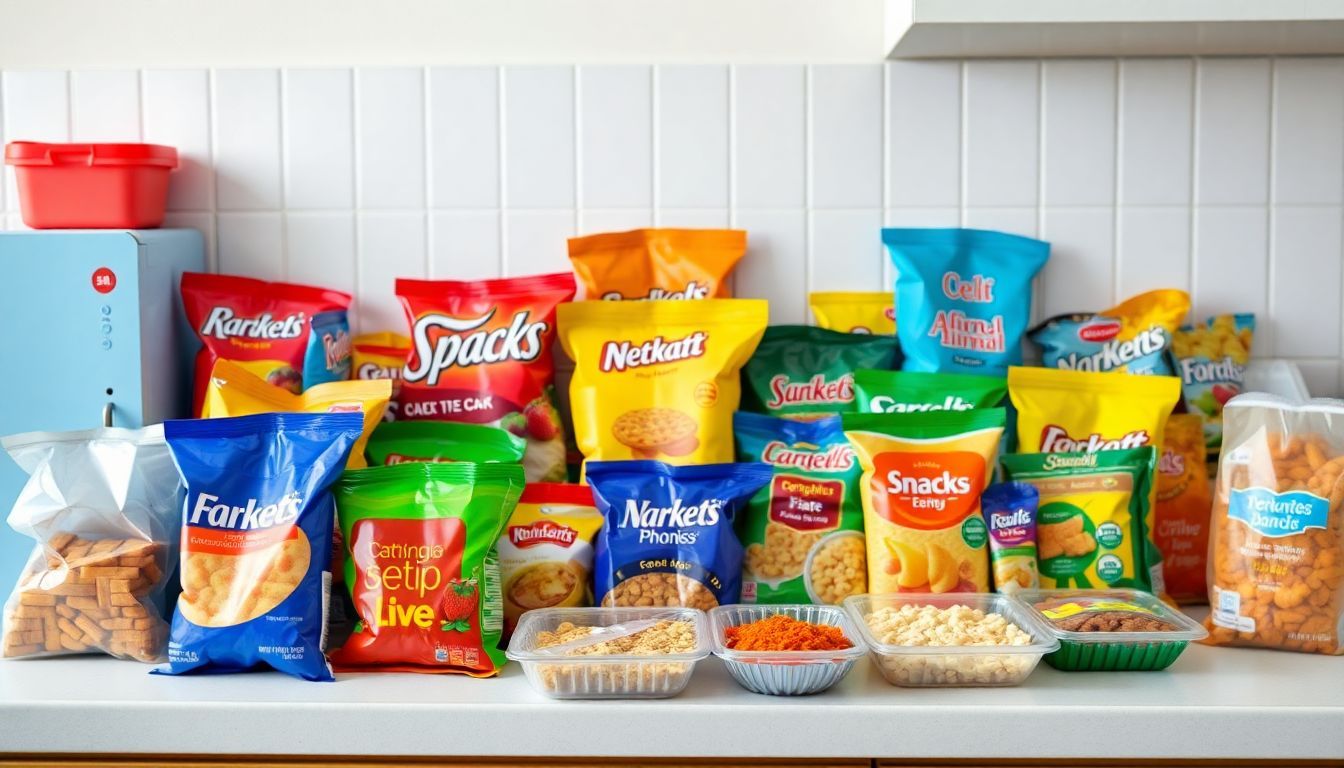Many people rely on packaged foods for quick meals, but these choices may harm health. Studies show ultra-processed foods can lead to obesity, heart disease, and even cancer. This blog will explain what these foods are and how they affect your body.
Thank you for reading this post, don't forget to subscribe!Keep reading to learn how small changes in your diet can make a big difference!
Key Takeaways
- Ultra-processed foods (UPFs), like sugary cereals, frozen meals, and energy drinks, make up nearly 60% of adult diets in the U.S. These foods are low in nutrients but high in added sugars, unhealthy fats, and preservatives.
- Studies link UPFs to obesity, heart disease, and cancer. A study led by Kevin Hall showed a UPF diet caused participants to eat 500 extra calories daily and gain about 2 pounds in two weeks.
- Research proves health risks: A NutriNet-Santé Study found a 10% rise in UPF intake increases coronary heart disease risk by 13%. Another large study tied eating these foods to a 23% higher chance of colorectal cancer.
- Additives like carrageenan or artificial colors may harm gut health or trigger issues such as hyperactivity in kids. Between 2001–2019, food products with additives rose from about half (49.6%) to nearly three-fifths (59.5%).
- Switching to whole or minimally processed foods like fruits, vegetables, nuts, beans, and home-cooked meals can reduce these risks while offering essential nutrients for better long-term health.
What Are Ultra-Processed Foods?
Ultra-processed foods are made using many industrial methods and ingredients. They often include additives, preservatives, or other chemicals that extend shelf life or enhance flavor.
Definition and characteristics
Ultra-processed foods (UPFs) are products made mostly from substances like oils, sugars, fats, and modified starches. They often include additives such as preservatives, colorings, or flavor enhancers to improve taste or extend shelf life.
These foods undergo heavy industrial processing with little to no whole food ingredients left. The NOVA classification system lists them in Group 4 due to their high level of manipulation during production.
Examples of UPFs include sugary cereals, energy drinks, sports drinks, packaged snacks, fizzy sodas, dehydrated soups, and ready-to-eat meals. Reconstituted meat products like hot dogs and chicken nuggets also fall into this category.
In the U.S., these foods make up nearly 60% of adult diets and about 70% for children—a staggering portion considering their low nutritional value yet high levels of added sugars and unhealthy fats.
Examples of common ultra-processed foods
Many foods we eat today are ultra-processed. They often contain high amounts of additives, sugar, and unhealthy fats.
- Frozen meals are quick but packed with preservatives and modified starches.
- Soft drinks have added sugar or substitutes that harm health.
- Fast food is full of salt, unhealthy oils, and artificial flavors.
- Deli meats like ham and salami have nitrates and a lot of sodium.
- Microwaveable dinners are loaded with emulsifiers and artificial colors.
- Chips contain artificial flavorings and high levels of unhealthy fats.
- Packaged breads often include preservatives to stay fresh longer.
- Ice cream may have carrageenan to improve texture but adds no nutrition.
- Sugary cereals disguise themselves as healthy but are loaded with sugar substitutes.
- Sweetened beverages like energy drinks contribute to weight gain without offering nutrients.
These foods may seem convenient, but they can negatively impact your body over time!

New Evidence on Health Risks
Studies show ultra-processed foods are linked to serious health risks. These include conditions that affect your heart, weight, and overall long-term wellness.
Links to obesity and weight gain
Ultra-processed foods (UPFs) can lead to weight gain and obesity. In one NIH study led by Kevin Hall, participants on a UPF diet consumed 500 extra calories daily. This caused an average weight gain of 2 pounds in just two weeks.
On the other hand, those eating minimally processed foods lost weight during the same period.
Highly processed meals often contain modified starches, added sugars, and unhealthy fats that provide empty calories. These ingredients make you feel less full while encouraging overeating.
Sugary cereals, energy drinks, and packaged snacks are common examples that can harm your dietary habits over time.
Increased risk of heart disease
Eating more processed foods raises the risk of heart disease. The NutriNet-Santé Study found that a 10% increase in these foods leads to a 13% higher chance of coronary heart disease.
Another study linked high intake to cardiovascular diseases and early death.
These products often contain too much salt, sugar, and unhealthy fats. They harm cardiovascular health over time. Sugary cereals, energy drinks, or packaged snacks are common culprits in many diets today.
Cutting back on them can lower this risk significantly.
Next is the potential links between these foods and cancer risks…
Potential connections to cancer
Ultra-processed foods may raise the risk of cancer. Studies reveal a link between UPF consumption and certain cancers, like breast and colorectal cancer. A large study with 625,738 participants showed that eating these foods increased the chance of developing colorectal cancer by 23%.
These risks might come from obesogenic properties in the food or exposure to harmful components. Additives, modified starches, and other chemicals can play a role. High sugar, salt, and fat content also contribute to chronic diseases tied to cancer development.
The problem worsens due to frequent consumption of sugary cereals, energy drinks, or snacks found in every supermarket aisle.
Why Ultra-Processed Foods Are Harmful
Ultra-processed foods, like artificial chemicals and additives, often contain substances your body doesn’t need. They can disrupt your gut microbiome and lead to long-term health problems.
High levels of salt, sugar, and unhealthy fats
Foods filled with salt, sugar, and unhealthy fats harm the body. Many ultra-processed foods like sugary cereals and energy drinks pack these ingredients. High salt increases blood pressure—raising risks of heart disease.
Too much sugar causes weight gain, type 2 diabetes, and tooth decay. Unhealthy trans fats lead to high cholesterol and inflammation.
Kevin Hall’s NIH study showed people eating more processed foods consumed about 500 extra calories daily. Kids in the U.S. get 67% of their total calories from these foods—making it worse over time.
Chronic diseases like cardiovascular issues often follow diets rich in processed options.
Presence of additives and preservatives
Additives and preservatives are common in ultra-processed foods. Between 2001 and 2019, the percentage of products using them jumped from 49.6% to 59.5%. Baby foods saw a sharp rise too—20% more purchases now include these ingredients.
Some additives can harm health over time. Carrageenan might trigger gut issues, while emulsifiers like sorbitan tristearate could lead to weight gain. Artificial colors have been linked to hyperactivity in children.
These chemicals often extend shelf life or improve taste but come with hidden risks for public health.
Reducing Consumption of Ultra-Processed Foods
Cutting back on ultra-processed foods can improve overall health. Simple changes in dietary habits make a big difference over time.
Tips for identifying ultra-processed foods
Ultra-processed foods can hide in plain sight. Identifying them is key to making healthier food choices.
- Check ingredient lists carefully. Look for items not commonly found in home kitchens, like high-fructose corn syrup or modified starches.
- Watch out for cosmetic additives. Ingredients like artificial flavors, sweeteners, and emulsifiers point to ultra-processing.
- Use tools like mobile apps. Open Food Facts, for example, helps spot packaged ultra-processed products easily.
- Be cautious with long ingredient lists. Foods with many unfamiliar components are often ultra-processed.
- Avoid flashy packaging claims alone. Marketing can mask unhealthy ingredients or processing methods.
- Examine common processed foods more closely. Items like sugary cereals, energy drinks, sports drinks, and some breakfast cereals often fall into this category.
- Skip products with added preservatives or colors that mimic freshness or texture enhancement.
- Look for minimal processing instead of chemical treatments. For instance, choose whole wheat bread over versions containing modified starches and extra sugars.
Whole and minimally processed foods offer a better path to health benefits—and the next step focuses on why these foods matter most!
Emphasizing whole and minimally processed foods
Shifting to whole and minimally processed foods can improve health. These options are closer to their natural state, keeping vital nutrients intact. Foods like fresh fruits, vegetables, whole grains, nuts, and beans offer better nutrition compared to heavily altered items like sugary cereals or energy drinks.
Cooking at home with fresh ingredients can also reduce the intake of harmful food additives. Meals made from scratch help you control salt, sugar, unhealthy fats, and other risky elements found in many ultra-processed products.
Simple dietary guidelines suggest eating more unprocessed foods for long-term health benefits—including lower risks of chronic diseases such as type 2 diabetes and heart disease.
More Greens, Less Red Meat: A Smarter Approach to Nutrition
Eating more plant-based foods can improve health and lower disease risks. Beans, lentils, peas, and vegetables offer key nutrients without the downsides of processed or red meats. These plant-based options are rich in fiber, vitamins, and minerals.
Dietary guidelines suggest cutting back on red meat while increasing greens. Too much red meat links to heart disease and high blood pressure. Adding leafy vegetables like spinach helps maintain a healthy gut microbiome and lowers chronic inflammation risk…
leading into smarter food choices overall!
Conclusion
Ultra-processed foods may be tasty and easy, but they come with risks. Studies show links to heart disease, obesity, and even cancer. Choosing whole or minimally processed foods can protect your health.
Small changes—like fewer sugary cereals or ready meals—make a big difference over time. Your body deserves better fuel!
For more detailed insights on incorporating healthier dietary habits, check out our guide on More Greens, Less Red Meat: A Smarter Approach to Nutrition.
